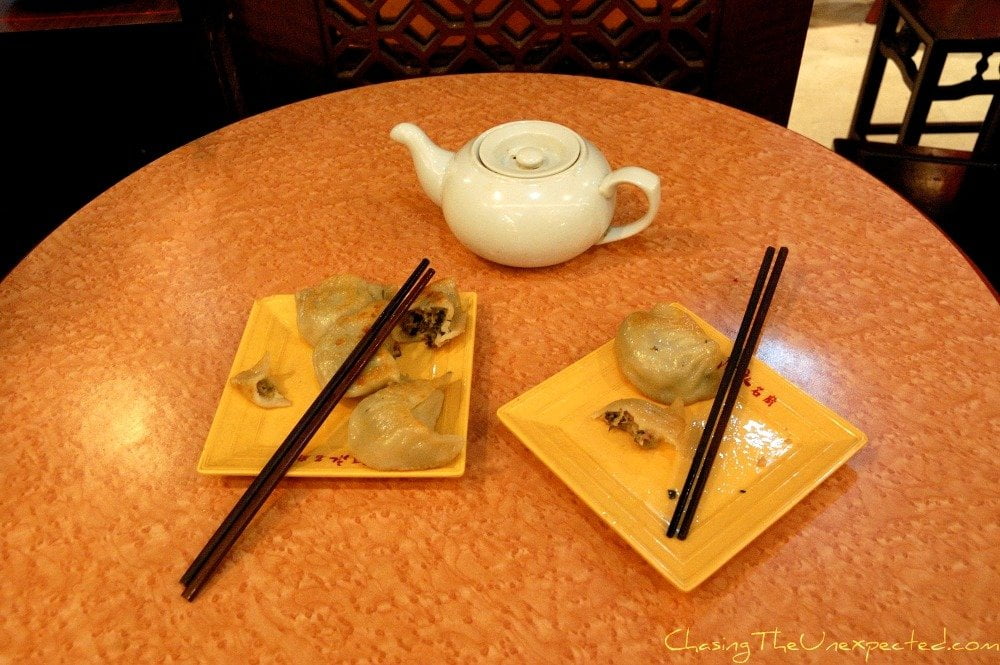You are in China on holiday, business trip, starting an expat experience, what’s your first thought? How will I survive in Chinese? Do I need to learn Mandarin Chinese? Even if you are not fluent, you better learn some of the Chinese words that will help you ensure survival: how to order food.
READ MORE: How to plan your first trip to China

Ordering food in Chinese – Table of content
- Speaking Mandarin at the restaurant in China
- Ordering to drink in Chinese
- Ordering food in Chinese
- Ordering popular Chinese dishes in Mandarin
- Eating customs in Chinese restaurants
- Tips and expressions in Chinese for daily-life situations
Speaking Mandarin at a restaurant in China
As soon as you walk in any restaurant in China, you will be welcomed by a waiter/waitress who will ask you how many people you are with: Ji wei? (几位?).
Once you told him/her how many (yi/liang/san/si/wu ge ren 一/两/三/四/五个人), he/she will bring you to your table, inviting you to have a sit: Qing zuo zher ba (请坐这儿吧)!
Once at the table, if they don’t bring you the menu straight away or they bring fewer menus than needed, you might ask for one in Mandarin Chinese: Cai dan (菜单).
The first thing the waiter will ask you is what you would like to drink: Ni xiang he shenme? (你想喝什么?)
Ordering to drink in Chinese
Some menus come with English translation or pictures, which allow you to just point at what you want to drink, but if your restaurant is not the case, here are some of the most popular orders:
A glass of water: yi bei shui (一杯水); A bottle of water: yi ping shui (一瓶水)
Orange juice: ju zhi (橘汁)
Flower tea: hua cha (花茶)
Two glasses of beer: Liang bei pi jiu (两杯啤酒); A bottle of beer: yi ping pi jiu (一瓶啤酒)
Red wine: hong jiu (红酒).
Ordering food in Chinese
Chinese cuisine is very diverse and delicious, and this means that it can also be tricky at times. Certainly, it’s difficult for vegetarian, as Chinese people have a hard time even understanding what being vegetarian means.
Meat is widely present in Chinese culinary tradition, and ordering strictly vegetarian is difficult, to the extent that pure vegetarians will need to list all the ingredients they don’t want: beef, pork, chicken, duck, fish.
In this case, it’s useful to know how to say it in Mandarin Chinese, as most waiters don’t speak English.
– I don’t eat meat: Wo bu chi rou (我不吃肉)
– I don’t want pork: Wo bu yao zhu rou (我不要猪肉)
– I don’t want beef : Wo bu yao niu rou (我不要牛肉)
– I don’t want chicken: Wo bu yao ji (我不要鸡)
– I don’t want fish: Wo bu yao yu (我不要鱼)
Ordering popular Chinese dishes in Mandarin

Other types of typical Chinese food or traditional dishes you might want to try are the dumplings, they have a huge variety and they are very delicious: shrimp dumplings (xia jiao 虾饺), dumplings made of rice flour served in a soup (tang yuan 汤圆), spring rolls (chun juan 春卷).
Some of the most popular dishes are Sweet and Sour Pork (Tang cu rou 糖醋肉), Diced Pork in Bean Sauce (Jiang bao rou ding 酱爆肉丁), Diced Fried Pork with Pineapple (Gu lao rou 咕咾肉), fried noodles (chao mian 炒面), noodles served with soup (dao xiao mian 刀削面), noodles served with fried bean sauce (zha jiang mian 炸酱面).
Usually dishes are best eaten with steamed rice (mi fan 米饭), and if you want to order one, you will ask: Qing lai yi wan mi fan (请来一碗米饭). The typical flavors of Chinese cuisine in Mandarin are: sweet (tian 甜), sour (suan 酸), spicy (la 辣), salty (xian 咸).
Eating customs in Chinese restaurants
When you have chosen your dishes, you call back the waiter to place the order: Fu wu yuan (服务员)!
As you know, the Chinese use chopsticks (kuai zi 筷子) to eat, but if you are not comfortable with them you can always ask for fork and knife, most restaurants have them.
So if you want fork and knife you can ask: Qing (pronounced [chin]) gei wo yi fu dao cha (请给我一副刀叉). Same question for the spoon: Qing gei wo yi ge shaozi (请给我一个勺子); or for a plate: Qing gei wo yi ge panzi (请给我一个盘子).
After you finished eating what you have ordered, the waiter will ask you if you want anything else: Hai yao shenme? (还要什么?). If you are done and you just want the bill (mai dan), your reply will be: Jiu zhexie le, mai dan (就这些了,买单).
Usually, they bring the receipt, but if they don’t, you can ask for it in Mandarin Chinese: Qing gei wo fapiao (请给我发票).
In China, there is not the custom to leave the tip, and it’s not expected, it’s entirely up to you if you want to leave something and how much.
When you are leaving the restaurant, unless you really didn’t like the food, you might want to say “Thank you” and “Goodbye”:
Xie xie, zai jian (谢谢,再见)!
Tips on how to deal with everyday life in Mandarin Chinese
Before setting off, I would recommend learning some Chinese to avoid arriving completely unprepared like I did. Mandarin Blueprint promises to teach you how to read and understand basic Mandarin in 2 months, how to read (graded) books and stories in under 6 months and to have complete conversations in under a year. Ambitious? Very. Possible? Why not. They offer a 30-day trial so it’s worth trying. Check it out now!
Words and sentences in specific situations:
- When travelling
- When renting a house
- When asking for directions
- If you get sick on the road
- To deal with money and banks
READ MORE: Book review: A Geek in China, a guide to the Middle Kingdom and life in China


Wow! Great tips for those who don’t speak Chinese =)
Thanks! Hope it will make it easier for someone :)
C’est pas vrai! Tu parles chinois????!!! L’article est trop sympa et amusant….
Merci! Je ne parle pas chinois, j’essaye à l’étudier un peu :P
Sicuramente meglio de ” su pane e casu e binu a rasu “!
lol! Questa non me la ricordavo!
Very helpful information along with those delicious photos! Thanks for letting us all benefit from your Mandarin studies.
Thanks Cathy, I know how difficult it can be at the beginning, so at least a couple of expressions can help :)
I am sure this is very helpful information to the non-Chinese speaking folks;) This is a very good and comprehensive guide of the basic Chinese expressions; like a little daily phrases book :D
Thanks Christy! This is exactly what I wanted, just a little guide to make it easier for foreigners at least at the beginning. I want to do other posts on this with different topics, like a small series. I know how frustrating it can be as when I arrived in Shanghai I knew no Chinese at all, the very beginning was a disaster for me. That’s why I also included some characters, in case the Chinese don’t understand foreigners’ pronunciation they can always show them the characters :)
The first words I learned in Spanish were for food, if you can eat you will be fine!
Sure it’s the first need, in China it feels a little weird at the beginning, even for me that i kind of eat everything (except crickets :P)
Everyone in a foreign country who has a food allergy or preference like vegetarian needs to know about the web site where they can get cards custom made. Select Wisely (http://selectwisely.com) They’ve save my digestive system when I’ve traveled to several different countries. I’m part of the company, I’m just an enthusiastic customer!!
That’s very useful, thanks for the link!
I’m a picky eater, so knowing the basics is a must. How do you say, “No green peppers please.” :)
Umm… peppers should be “hujiao” so I guess green peppers is “lu de hujiao”, you can try if you are in China, but I don’t guarantee they will understand :P
It wasn’t until 5 months into China that I really started focusing on learning Mandarin for food to kill time on a 22 hour overnight train. I think if someone had broken it down for me like this so simple I would have tried to learn from the minute I touched down. Really great post and break down!!! :)
I’m really glad you are finding these useful, I wish I had something so easy to start with when I arrive in China a year ago. Of course it’s not comprehensive of everything, but at least it gives some of the most important expressions we might need.
This is really helpful! When I was in China, until I started travelling with someone who spoke Mandarin I was mostly surviving on sweet buns and fried rice. Knowing a few words makes such a huge difference in a country where english speakers are often a rarity!
Thanks Megan, I’m glad you find this helpful. China is changing very quickly, and since last year I’ve been noticing more people are making the effort of learning English, although it’s still impossible to live here without knowing any Chinese!
This is a nice trip for people like me who cant speak Mandarin.
Food was the first thing I learned in Chinese. Ordering in a restaurant was priority for me haha.
eheh survival instinct isn’t it? Understandable ;)
Great post. Reading these sentences looks easy enough, and although I am always doing my best learning the language, there are some tong-twisting languages that don’t wrap easily around my brain and I am sure I insult just about anyone when speaking them. It’s very helpful that you have written it out in Mandarin – at least like that I can show them what I meant to say :)
That was exactly the purpose of writing the characters. I remember, before studying Mandarin I tried to read “water” to a waitress at a bar and she didn’t understand because I pronounced the wrong tone. After I started studying the language I learnt how to say water properly but who knows how many words I pronounce with the wrong tone :P